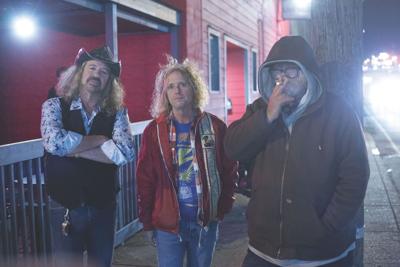The members of De Piratas — Jonathan Bright, Warner Hodges and Jeff Johnson — all admit they had no idea if their musical collaboration would work when they first got together. But it takes only one listen to their debut album F.U. to know they had nothing to worry about.
The album, which the band will self-release April 8, features eight tracks of unadulterated rock ’n’ roll — not surprising to anyone familiar with the trio’s work prior to coming together in De Piratas. What brought them together was The Rock Block, an irregular podcast series co-hosted by Bright and Frank Sass that explores Nashville’s rock history.
Hodges and Johnson were invited to be guests on the podcast in August to talk about the early days of punk rock in Nashville. Of course, Hodges and Johnson are best known as founding members of Jason and the Scorchers. Before the formation of the Scorchers, Hodges was a member of Johnson’s punk band The Electric Boys. After taping the episode, the former bandmates, who hadn’t seen each other in more than a decade, adjourned to a nearby restaurant to continue their reunion.
“Warner and I went to some barbecue place, and we texted J.B. and said, ‘Why don’t you come join us,’ ” Johnson recalls. “He said, ‘I’ve got stuff to do tonight, but I’ve got a studio, we ought to jam.’ Warner and I looked at each other and said, ‘Why not?’ So the next week, we went over there.”
Hodges and Johnson knew they had chemistry, but had no idea whether they would click with Bright. They both had been acquainted with him, however, from his earliest days in the Nashville rock scene as a member of the band Swing in the late ’80s.
“I didn’t know where it was gonna go,” Hodges says. “I had known Jonathan from afar for years, been semi-buds — ‘Hey, man, how’re you doing?’ — but never really worked with him.”
The first time they got together, Johnson brought in a number of musical ideas, and the first one they worked on would become the album’s title cut, “F.U.” They initially approached the song with Hodges on guitar, Johnson on bass and Bright on drums, but they soon decided that both Hodges and Johnson should play guitar.
“We played through it a couple of times and listened back, and it was like, ‘Well, that’s pretty fucking happening,’ ” Johnson says.
Bright suggested Johnson play the rhythm guitar part to a click track, and that became the band’s basic approach to the entire album. Johnson and Hodges added lead guitar parts to the rhythm guitar track, and then Johnson recorded a bass part. When they reconvened at the studio a week later, Bright had not only added drums to the song, he also had written a melody and lyrics, and sung the lead and backing vocal parts.
“We didn’t really have any idea of who was going to sing,” Bright explains. “Every song was written and arranged before we had any idea of melody lines or lyrics. After we were three or fours songs in, I thought, ‘Well, I’m going to try and sing on this one.’ After I did it, I was like, ‘I don’t know if they will like it, but this shit sounds great to me.’ ”
“I’ve been hearing Dan Baird coming out of the speakers, or me or Joe Blanton or Jason Ringenberg, for the past 25 years,” Hodges says. “When Jonathan’s voice came out of the speakers on that first mix I heard with him singing, it was like, ‘Oh God, we’ve got something here.’ It was good. I knew he could sing — I didn’t know it was going to be that great.”
Johnson puts it more succinctly: “J.B.’s a fucking genius.”
As both the title track and album opener, “F.U.” sets the tone for the record both musically and lyrically. It’s a tight hard rocker with a power-pop coating and a chorus that epitomizes the defiant rock ’n’ roll attitude that permeates the entire album: “I don’t care what you say ’cause it doesn’t matter anyway, I’m OK / You say it’s not fair ’cause I’m gonna do exactly what I want to do / So fuck you.”
“One of the places Jonathan really hit it off with Jeff and me was he’s a smart-ass,” Hodges says with a laugh. “He’s as sarcastic as we are, and Jeff and I are pretty sarcastic guys.”
Bright doesn’t disagree. “I’m just as big a smart-ass as them,” he admits.
Because they are mining similar influences, De Piratas have been compared to Cheap Trick. They acknowledged their kinship with that legendary rock outfit by inviting bassist Tom Petersson to play on the master version of “F.U.” He’s the only outside musician to appear on the record.
It’s clear all three members of De Piratas are pleased with their first offering as a band.
“I’m just thrilled we actually made something that we can put out, because I thought maybe we would do a song or two, but we just kept plowing through,” Bright says with excitement in his voice. “We knew what we were doing was good.”
Hodges sums up their collective feeling: “It was as fun as it sounds like it was.”





